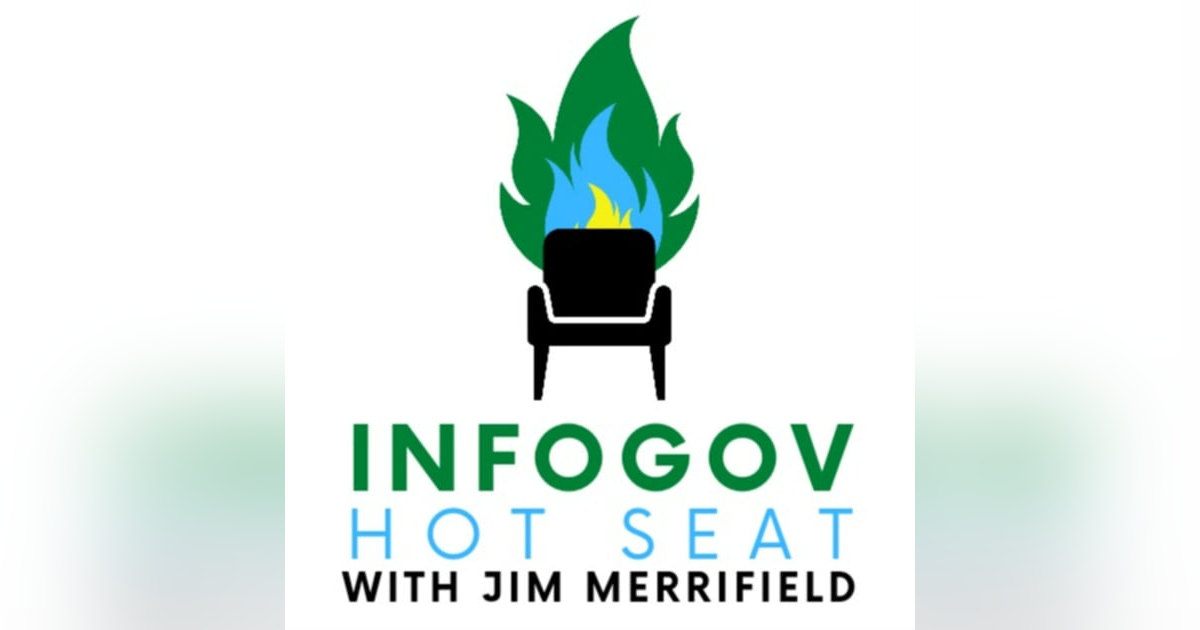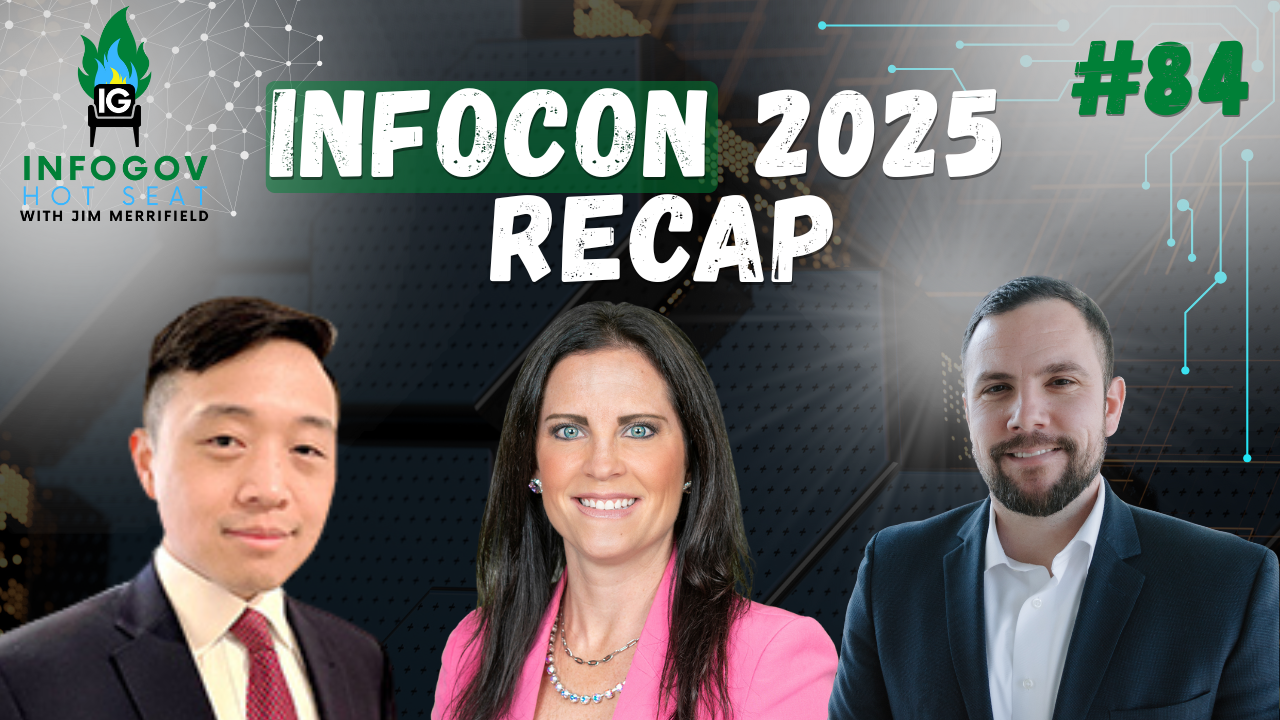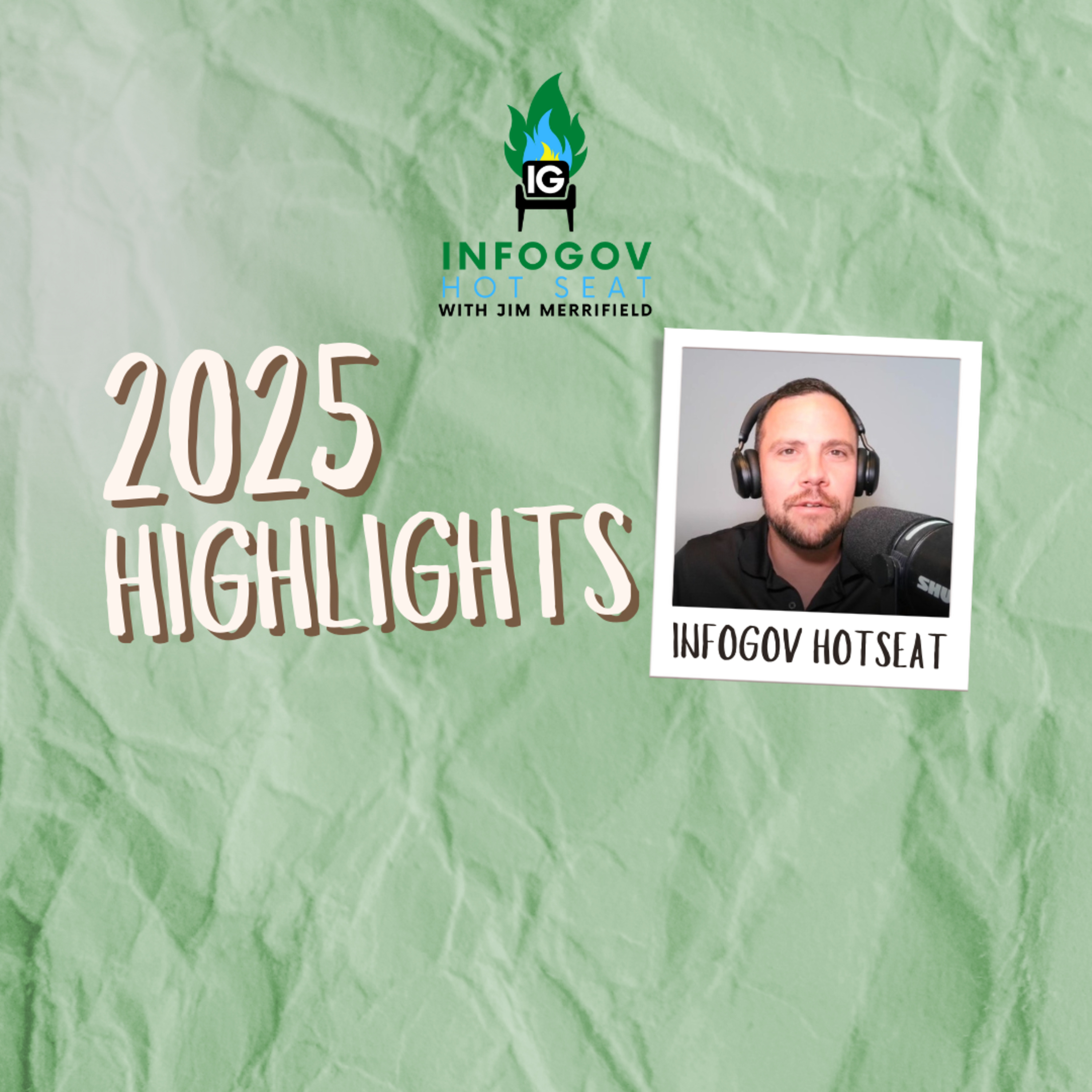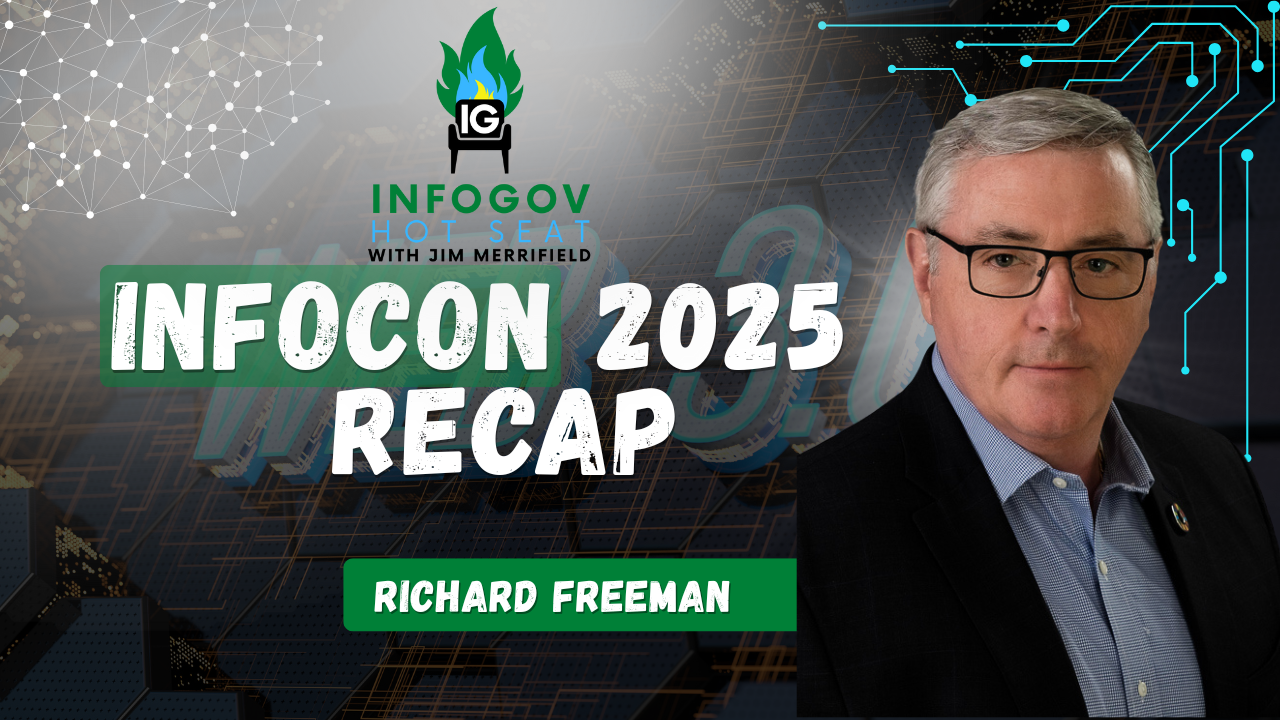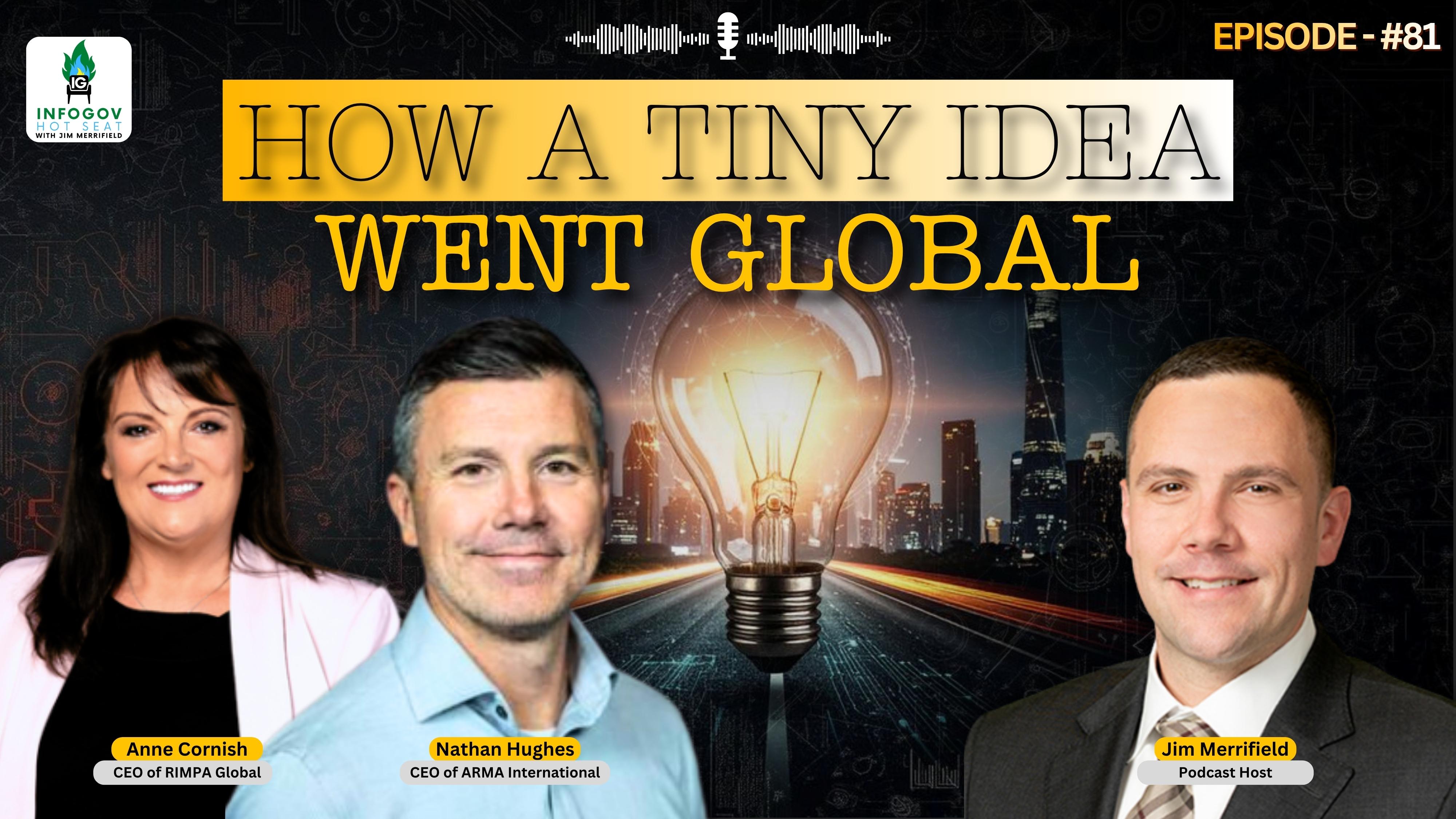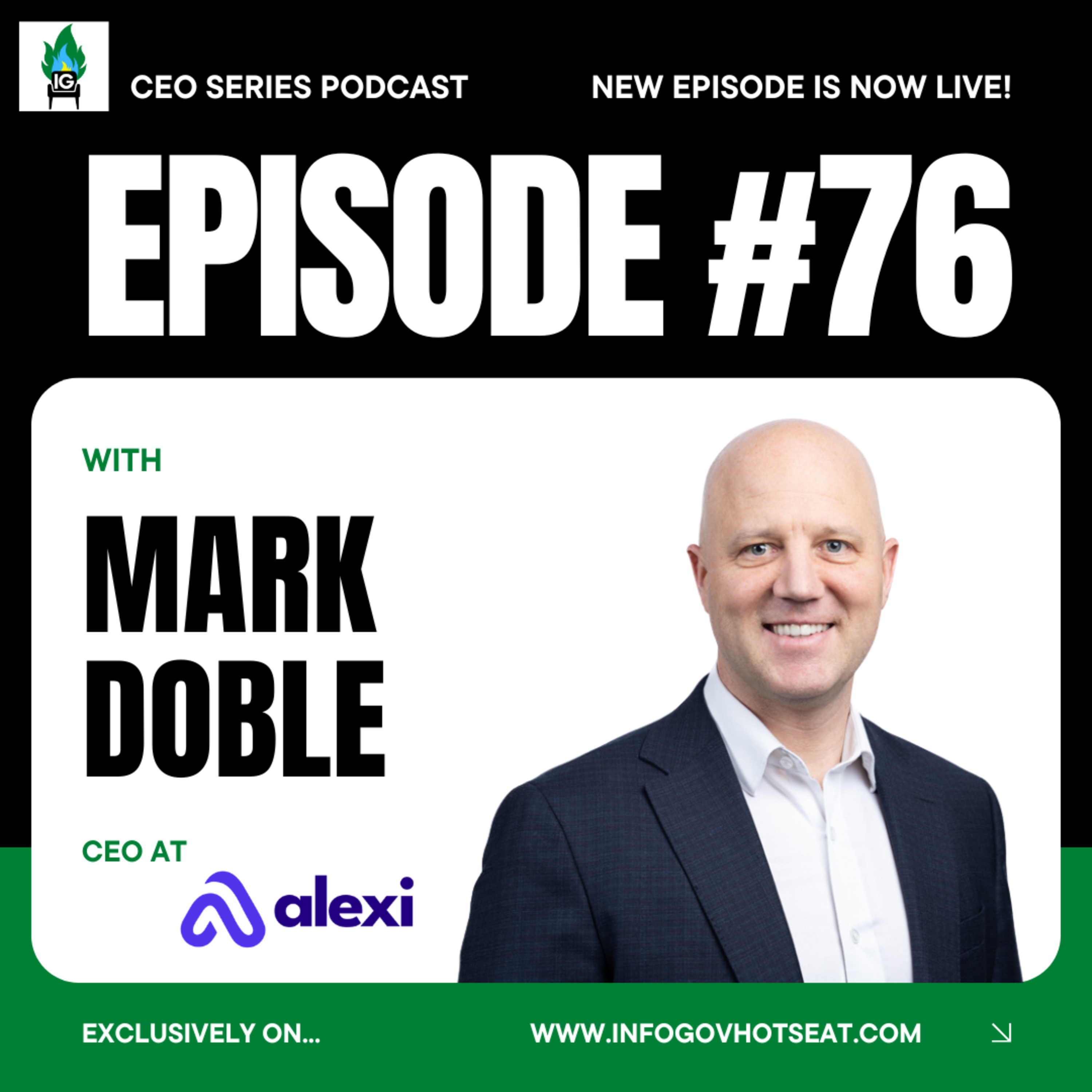IGHS53 - InfoCon2024 Takeaways with Tim Brady, CEO at Colligo
In this conversation, Jim Merrifield interviews Tim Brady, CEO of Colligo, discussing the evolving landscape of information governance, particularly in relation to email management and the impact of AI technologies. They reflect on key takeaways from Infocon 2024, emphasizing the importance of compliance and the challenges organizations face in managing their data effectively. The discussion also touches on the significance of prompt engineering and internal threats associated with AI, as well as the growing trend of improving records management practices.
Jim Merrifield (00:01.58)
Well, hello and welcome to the InfoGov Hot Seat. I'm your host Jim Merrifield and with me today is Tim Brady at Colligo Welcome, Tim.
Tim (00:09.412)
Thanks, Jim. Great to be here.
Jim Merrifield (00:11.298)
Yeah, it's great to have you in the hot seat. Get to chat with you after Infocon 2024. It was nice to see you in Houston. But before we get to Infocon, would you like to please provide a brief introduction of yourself, your current role, and one fun fact about yourself?
Tim (00:31.504)
Yeah, so I'm currently CEO of a company called Colligo and we're a North American based email management company. So intelligent email management and compliant email management. And before Colligo I like to say I grew up in the financial services industry at a bank and then at a hedge fund and got to see the challenges of information management, information governance firsthand, which is ultimately what led me to to Colligo and
know, fun fact about me when I'm not building Colligo and working, I am often found on the trails either running or cycling or on the golf course and love to be active and get outdoors and so doing whatever sport is interesting at the time.
Jim Merrifield (01:17.042)
Awesome awesome. So you're a golfer. So you're handicapped. What's your what's your handicap these days? You want to say that live on on recording?
Tim (01:22.374)
I would say I'm a wannabe golfer. I love being out there and nothing better to do in the summer on a weekend, I wouldn't say I definitely will not share my handicap on a public forum.
Jim Merrifield (01:35.862)
Hey, I tried. I tried. You know, hey, who doesn't like to hit the hit the links and have a few beers and have a good time in the outdoors? So from one golfer to another.
Tim (01:49.21)
Yeah, I was disappointed to have missed your ARMA New England golf event this year and last, but hope to make it out to that sometime soon.
Jim Merrifield (01:58.188)
Yeah, for sure. At some point we'll definitely connect and do it. So let's talk, So, thanks for the introduction with the company and again, your background. I know I saw you at Infocon 2024. You guys were, your company, Colligo was a supporter, an exhibitor at the event. And what were your key takeaways from the event?
Tim (02:23.398)
Yeah, so the kind of number one thing that dawned on me and was very apparent to me at the conference was the kind of dominance of Microsoft. You know, in previous years, you're having conversations about other platforms and things like that. And this year, it just really struck me that every conversation was, you know, we're on SharePoint or we're on Microsoft 365. Now, how do we make it compliant and work for our organization and manage our records in 365, right?
I would say in any conversation we didn't have that was directly in that was about how do we move, we're moving to SharePoint and we wanna bring our records management to SharePoint, right? And so that was just a very, very strong trend I noticed this year just being on the floor and across the different sessions and whatnot. And I think you continue to see Microsoft making a stronger name for itself and.
both the SharePoint adoption and it's really global, right? Not just North America, but around the world. One of the other trends that stood out to me was just digital adoption in general, right? It's no longer a question of if we do this in the cloud, right? It's now how do we do it and what's the best way to do it? What technologies can enable us to manage our records in the cloud? And that obviously has been...
going on for a number of years, but this year it was just extremely apparent to me that every organization's thinking about how do we do this, right, and overcoming the security challenges of the past and things like that. So curious if those things stood out to you at all and if you noticed anything similar on your side.
Jim Merrifield (04:02.998)
Yeah, for sure. think everybody's, know, most companies, right, are all in on Microsoft because we all own Microsoft to some degree. I think there's a lot of interest around copilot and AI and people are interested in how to secure the data within the Microsoft tenants. There are Microsoft tenants and that's why I think there's a lot of buzz around around Microsoft and copilot and
just cloud technologies to begin with.
Tim (04:36.55)
Absolutely. Yeah. And the other thing, and I picked this up at ARMA Canada in the spring as well, but it does seem like email management is front and center, right? And not just at our booth where we, know, where people come to us because they know that's what we do, but even looking across the sessions and speaking to folks at the different events, it does seem like everyone's struggling with email management as they always have, but now they're looking to do something about it, which is...
which is awesome, right? It's a very challenging thing. And our mission here is to make the very, very complex, make it super simple and easy. that was stood out across our whole team. were very positive just seeing that come up so much.
Jim Merrifield (05:20.578)
Yeah, I mean a lot of business is done, most business is done through email, right, these days and let's face it, no matter if you're a lawyer, a business professional, a solution provider like yourself, nobody likes to file emails. Like filing emails is like an administrative burden that nobody wants to spend the time to do. So.
I mean, you mentioned email management and you mentioned what Colligo how Colligo helps, I guess, solve that email management issue. What would be like your 30 second pitch? I know I'm putting you on the spot, but what would be like your 30 second pitch? How can you help us solve this email problem?
Tim (06:06.544)
Yeah, and it's really accentuating the point you just made. It's like something like five of every six records that come into the organization come in via email, right? Or 10 % of your emails you receive on a daily basis as an average knowledge worker are records that need to be put away somewhere. And so how do you take them out of email and store them where they should be stored, right? Have the right retention disposition on them. Maybe grab some metadata along the way so you can actually find the things later.
And how do you make that insanely easy for users? And so at Colligo our mission is just make that complex process extremely simple, use intelligence and automation to make it, extract the metadata and things like that automatically, and just help you get them from Outlook into SharePoint where they fall under these policies and are secure and compliant, and just make that super easy from the app you're already spending your day in and where the records are coming into the organization.
Jim Merrifield (07:00.482)
I like the pitch. I like the pitch, Awesome, awesome. So I know there were lots of discussions around AI. I'm sure AI can help with email management at some point, right, in the near future if it's not already. But there's a lot of talk around AI at this conference, at every conference these days. What advice would you give IG professionals to stay ahead of the curve? Because it seems like
This group is positioned well to kind of pave the way for corporations and organizations to safely utilize AI.
Tim (07:41.67)
Yeah. You know, we commonly give the advice of my view is that, you know, don't, right? Don't just plug it in and try it and roll it out broadly. so stop pause. And, you know, what's great about this group of the conferences, these are the folks that are, and this is even a change year over year are having those conversations and thinking about how do we build the foundation? How do we control our data? Let's structure it a little bit, clean it up, figure out what we have, what we don't have first before we go and roll out any.
copilot like agent, right? And that's the right approach. You know, get an environment or a location where you know what's in it, what results are going to turn up when you try something like a copilot and, and you plug it in and point it at that test location first to make sure you're happy with the results and the accuracy and all those things. And then look to roll it out broader, but it's, it's, it's a journey, right? You need to go through the whole AI readiness cycle before you plug these things in. you know, if I think about, really,
put it into two buckets of risk, right? And there's the oversharing risk, which is you don't want things to turn up that shouldn't be there, right? What's someone's salary? And it turns up a number that's supposed to be confidential as an example. But then the undersharing risk. And if it doesn't return results that are effective and what people want, and it's too locked down, then no one's going to use it. And so I wish there was like a clear cut and go error on this side, but it really is finding that delicate balance of the two things. And it's really important to get right, but.
the community at ARMA. We're having a lot of those productive conversations, but how do I tag these documents? How do I tag these emails? How do I make sure that the permissions are correct in this area? And all those things. And that's a notable change year over year, but that's our recommendation is do that heavy lifting first. Prepare a plan. Measure twice, cut once type thing. And this group seems to be on top of it.
Jim Merrifield (09:33.238)
Yeah, 100%. I mean, there's a lot of interest around purview and tagging and sensitivity labels and things like that. not just deploying technology like copilot without kind of understanding how the data is being extracted into the copilot tenant. think a lot of the, what's an interesting conversation though is there's a lot of companies, both law firms.
corporations at the conference, there's a lot of interest in understanding the risk related to internal threats rather than external threats related to deploying AI, especially around copilot. I don't know if you have any insights into that because it seems like everything I'm reading and in the conversations that I had at Infocon, people are less worried about the external threats because especially around
Microsoft's copilot because technically it's within your your tenant, right? Your instance. But as you mentioned with salary data, that's more of an internal threat. Would you agree?
Tim (10:43.696)
Yeah, I think that's an interesting take, right? And as long as your co-pilot is staying in and retrieving data from within your tenant and your boundaries, then there's less risk there. What, you know, some things I've been reading about is how external is able to come in and see what prompts are being made and have influence over the results and things like that. So always, you know, making sure you're aware of those external risks, but.
Yeah, in theory, could be M&A plans, share buyback programs, salary data. So it's certainly the internal is huge here. And I think that's what most people are focused on, right? Is the boundaries and the guardrails to keep it contained, to start anyway. But I'd say certainly keep an eye on both the external is there's a lot going around in new circles about the external threats with the AI agents as well.
Jim Merrifield (11:41.388)
Yeah, for sure. Especially around prompt engineering organizations. I think it was, at least in the law firm world, we're always focused on precedent documents, knowledge management, and things like that. And I think a trend we're probably going to see over the next three to five years is organizations being very, what do I say? How do I say this? A little
Jim Merrifield (12:11.65)
creating almost vaults for their prompt and engineering strategies. I've been reading a lot about prompt engineering and there's a lot of, I think there's a lot of efforts around that, a lot of training, a lot of certifications. Are you seeing that as well?
Tim (12:31.234)
One thing I've been thinking a bit about and just saying it out loud for the first time is, when there's a prompt that goes into an AI agent, we'll call it co-pilot, and it produces a result and then you take action based on that result, is that a record? And how do you store that? How do you keep record of that? And I think we're entering new territory. We still have to figure many of these things out. And I say we as a collective.
you know, organizations, information management, information leadership community, but you know, there's a, you know, someone as simple as something like a policy or vacation policy, even, and they take vacations and think they roll over based on an old policy, but you know, the co-pilot agent returned the wrong, wrong version, right? And it's things like that, that can be super simple and not harmful, but there's bigger examples where it could be super harmful. So I think we have to wade through all of those things that maybe
Maybe the prompts and the responses should all be kept in a vault as you're speaking to, but all areas that are super interesting to see how they will evolve over the next few years.
Jim Merrifield (13:37.024)
Yeah, it'll be interesting to see how prompt engineering improves search. I know a lot of organizations are still struggling with search, right? We save things in all these different places, but to actually find the information we need when we need it, it's a whole other issue that we're dealing with. So we'll have to wait and see, as you said, how things evolve and develop. So Tim, I know we talked about a lot around the conference, around AI and the different conversations that you had.
at the event, was there anything else that you wanted to share with the audience?
Tim (14:12.678)
Yeah, and I just build on that kind of point you made there that, you know, I think the key from our view anyways, is centralized things into the system of record or where they're supposed to be stored, right? And that'll allow you to query and find what you're looking for with much more ease. It also helps when you're searching with the various co-pilot agents. know, a trend we're seeing, I'll just maybe highlight a few trends we're seeing in email management. So it's an area we spend most of our time in and reading about.
whatnot and you know, kind of the common things we're seeing right now are a lot of storage problems where people are running into the upper limits of what outlook, you know, now that it's been out for many years or a number of years and even like online archive is now hitting limits at a lot of organizations. So that's a big challenge that organizations are going to have to deal with and store all those records that we thought were going to be able to live there forever into that other place. Right. And so, so that's one thing we're kind of seeing. I mean, if we think about
data being the next gold rush, right? Every organization has so much data, almost too much, right? And it's only gonna keep growing, but that data has the potential to be the value of the organization in the future. So how do you harness that, find what's important, what's not, and extract value from it ultimately, or else there's no point in doing it, right? Driving business value, driving insights from that is really the key there. And so those are kind of the things we're seeing and spending a lot of time on. I mean, obviously,
We didn't touch on it too much, the plethora of organizations looking at Purview and certainly Topical at ARMA, but everywhere in Microsoft land right now. And then whether it's that or the other, the records management solution providers like Gimmal that are obviously helping a lot of organizations when you get your records into SharePoint and things like that. mean, it just seems to be like the trend of...
Improving our records management is stronger than I've ever seen it and it's a really exciting time right to bring all these things together the records the data the storage issues the compute power right and So that's what keeps me excited right now and where we're spending a lot of time thinking about things
Jim Merrifield (16:19.766)
Yeah, I could see your excitement around data and you you mentioned data is the new gold. I think that was actually a Super Bowl commercial, right? With Matthew McConaughey, I think last year. I think you literally I think he came out and said it was a I think it was a Salesforce, you know, commercial on the Super Bowl and he says something about data being the new gold. So I guess our industry finally hit the Super Bowl, right? We finally spent some money on that million dollar ad commercial.
Tim (16:49.51)
There we go. Well said. Well said.
Jim Merrifield (16:49.826)
We'll see what happens this year. I'm sure there'll be tons of AI commercials and things like that. So there's lots to look forward to. I mean, this is an exciting time to be in our industry. I think we're just on the tip of the iceberg here. looking forward to having more conversations with you, especially around that concept that you said, Tim, about is it a record? Is when you keep prompting and getting results.
At what point is it a transitory file or document? And at what point does it become a business record? I don't think anybody's really answered that question. So it'll be interesting to see how that concept develops over time. So again, listen, Tim, yeah, thanks so much for spending some time, having some conversations here on the hot seat, sharing your advice and your insights into the event and then the industry in general.
Tim (17:35.385)
Absolutely.
Jim Merrifield (17:47.164)
If you'd like to be a guest on the hot seat like Tim here, all you have to do is submit your information through our website infogovhotseat.com and thank you so much and enjoy the rest of your day. And thanks so much, Tim, once again.
Tim (18:02.234)
Yeah, thanks, Jim. It's been a pleasure and great to see what you're doing in the industry. So really keep it up.
Jim Merrifield (18:08.32)
Absolutely. Likewise, thanks for the support.

CEO, Colligo
Tim is CEO of Colligo. Prior to founding Colligo in its current form, Tim spent years in the financial services industry, both with a large Canadian bank and a hedge fund, seeing the compliance and governance challenges Colligo now solves first-hand. Tim spent most of his career specializing in enterprise software.
When not working on Colligo, Tim can often be found running, cycling hiking, or working out.
